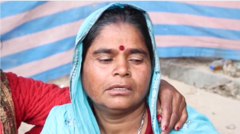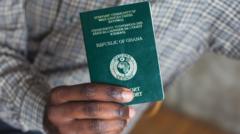A string of suicides among Kenyan medical interns has drawn attention to the dire working conditions they endure. With delayed salaries and overwhelming stress, the trainees are increasingly facing mental health challenges. Unresolved disputes between the government and medical unions continue to exacerbate the situation, prompting calls for urgent reform.
Trainee Doctors in Kenya Face Dire Conditions as Suicides Rise

Trainee Doctors in Kenya Face Dire Conditions as Suicides Rise
The tragic increase in suicides among trainee doctors in Kenya highlights the severe working conditions, financial struggles, and mental health challenges faced by medical interns.
In a somber reflection of the state of healthcare in Kenya, a recent wave of suicides among trainee doctors has raised alarms about the distressing impacts of poor working conditions, financial struggles, and inadequate support systems for medical interns. The tragic burial of 29-year-old Francis Njuki, a pharmacist intern, cast a pall over the community, underscoring the mental health crisis among medical professionals.
Njuki’s family revealed that he had expressed deep exhaustion and frustration stemming from the non-payment of his government salary since beginning his internship in August. His death marked the fifth reported suicide of a medical worker in Kenya over the last two months, attributed to relentless work pressures and inadequate insurance coverage, according to Dr. Davji Atellah of the Kenya Medical Practitioners and Dentists Union (KMPDU). The situation has alarmingly escalated, with five additional suicide attempts reported this year alone.
Interns like Njuki provide essential services in public hospitals, yet many struggle with financial burdens, as the government has delayed their salaries for months. Reports suggest both poor remuneration and extreme work hours contribute to the downward spiral of mental health among these future caregivers. The current interns, making up about 30% of the healthcare workforce, describe a workplace rife with challenges yet lacking essential support.
The Kenyan government is currently in a dispute with medical unions over compensation, proposing to slash intern salaries to $540 monthly, a fraction of what was previously agreed upon. Despite public outcry and the plight of healthcare workers affecting patient care, President William Ruto has emphasized fiscal constraints.
Pressure has mounted for immediate action, prompting the release of $7.4 million toward overdue salaries for over 1,200 medical interns. Despite these efforts, complaints regarding low wages persist, leading many interns to consider leaving their profession for lucrative opportunities abroad or abandoning medicine altogether.
The outcry has prompted young doctors to mobilize campaigns under the hashtag #PayMedicalInterns to voice their frustrations, with some conducting marches to government offices.
As mental health emerges as a critical issue, Health Minister Deborah Barasa acknowledged the ongoing struggles faced by healthcare workers and has proposed workplace mental wellness programs to expand support systems. However, experts warn the trauma of feeling unable to deliver adequate patient care, termed "moral injury," is taking a toll on many young doctors.
The tragic pattern of suicides has pressed for greater recognition of mental health topics within medical education, as well as better working conditions. Advocates have called for immediate reforms, asking if enough lives must be sacrificed before meaningful changes occur. In the midst of such despair, one intern poignantly summed up the sentiment: “It’s becoming a thankless job.”






















